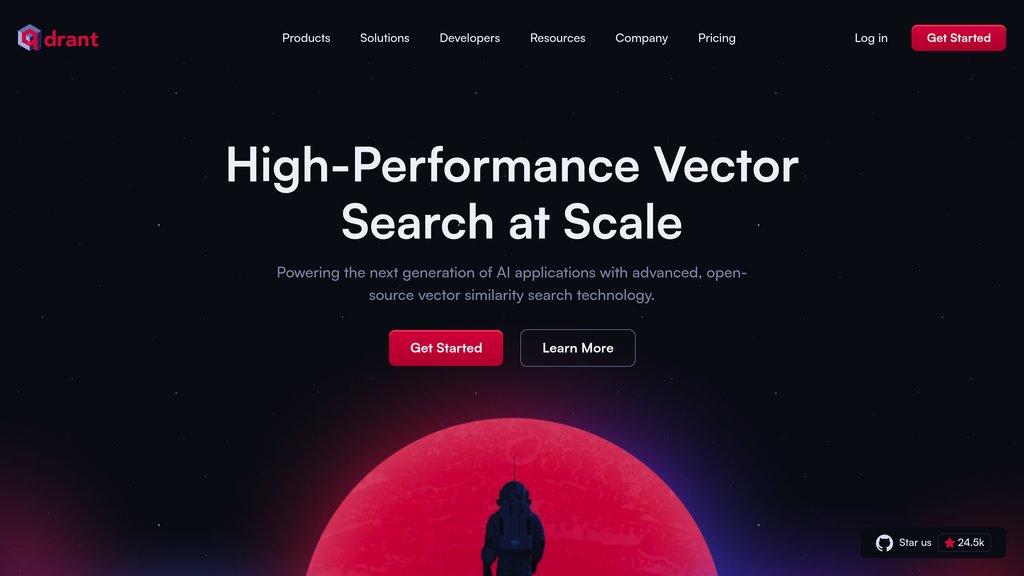Qdrant
Open-source vector database built in Rust for high-performance similarity search and vector storage at scale.
Community:
Product Overview
What is Qdrant?
Qdrant is a high-performance, open-source vector database specifically designed for handling high-dimensional vector data and similarity search operations. Built entirely in Rust, it provides exceptional speed, reliability, and scalability for modern machine learning and data science applications. The platform excels at storing, indexing, and querying billions of vectors while maintaining low latency and high accuracy. Qdrant supports various distance metrics including cosine, dot product, and Euclidean distance, and features advanced filtering capabilities that enable hybrid search combining semantic relevance with structured metadata conditions. Its cloud-native architecture ensures seamless scaling and zero-downtime upgrades.
Key Features
High-Performance Vector Search
Built-in HNSW indexing algorithm delivers fast and accurate nearest neighbor search on dense vector data with support for multiple distance metrics and low-latency queries on large datasets.
Advanced Filtering and Hybrid Search
Combines vector similarity search with structured metadata filters, enabling context-aware results through numeric, text, and tag-based filtering alongside semantic ranking.
Real-Time Data Operations
Supports immediate searchability after vector insertion with consistent performance for frequent insert, update, and delete operations in production environments.
Flexible Deployment Options
Runs as standalone binary or in Docker/Kubernetes with REST and gRPC APIs, offering SDKs for Python, JavaScript, Go, and Rust for seamless integration.
Storage Optimization
Memory-mapped file access with on-disk persistence, built-in compression options, and efficient resource usage for both high-load and constrained environments.
Use Cases
- Retrieval Augmented Generation : Enhance large language model outputs by efficiently retrieving relevant context vectors and integrating diverse data points for improved content quality.
- Recommendation Systems : Build personalized recommendation engines with flexible scoring strategies and multi-vector queries for highly responsive and tailored user suggestions.
- Advanced Search Applications : Power semantic search capabilities across text, images, and multimodal data with nuanced similarity matching and deep semantic understanding.
- Anomaly Detection : Identify patterns and outliers in complex datasets using vector representations for robust real-time anomaly detection in critical applications.
- Intelligent Agent Systems : Enable sophisticated agent workflows with powerful vector search infrastructure for complex task handling and real-time adaptation capabilities.
FAQs
Qdrant Alternatives
Vast.ai
A GPU marketplace offering affordable, scalable cloud GPU rentals with flexible pricing and easy deployment for AI and compute-intensive workloads.
Pinecone
Fully managed vector database platform designed for scalable, low-latency similarity search and real-time indexing of high-dimensional data.
Tavily
Advanced search engine optimized for AI applications, providing real-time, accurate, and contextually relevant results.
Milvus
High-performance, scalable vector database designed for efficient AI-powered similarity search and analytics across diverse unstructured data.
AMiner
Comprehensive academic intelligence platform providing scientific literature search, researcher profiling, and scholarly data mining services.
Surge AI
Advanced global data labeling platform delivering high-quality datasets for AI training with human-in-the-loop accuracy and seamless integrations.
Google Research
Google Research drives cutting-edge AI and scientific innovation, advancing technology with responsible, impactful solutions across diverse domains.
Zilliz Cloud
Fully managed, high-performance vector database built on Milvus for scalable AI applications and unstructured data search.
Analytics of Qdrant Website
🇮🇳 IN: 12.67%
🇺🇸 US: 10.45%
🇩🇪 DE: 8.11%
🇷🇺 RU: 3.36%
🇨🇳 CN: 3.2%
Others: 62.21%
